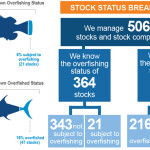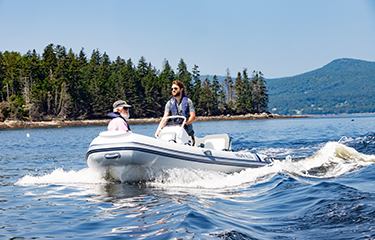A boatyard in Isleboro, Maine, U.S.A. has released a fully electric, 40-horsepower engine powered by solar panels, the first ripple in what its owners believe will be a tsunami of change in propulsion systems soon to hit the U.S. commercial fishing industry.
The vessel was created as part of a collaboration with the nonprofit Island Institute, which is also working to advance the electrification of Maine’s working coast. It recently created an introductory course on electric boats, working with Maine Community College System and Mid-Coast School of Technology, and is encouraging solar energy installations at wharves and docks, according to MaineBiz.
Electric outboard motors offer benefits that include significantly reduced Co2 emissions – even when charged with non-renewable energy sources – less water pollution, more predictable operating costs, and quiet operation, according to Island Institute President Kimberly A. Hamilton.
“We have a vision for a fully electric working waterfront in Maine,” Hamilton said. “It’s right for the environment and right for business resilience. This partnership with Pendleton Yacht Yard, and others in the works, are important steps in moving our state towards its climate goals – seeing is believing.”
Generation after generation of fishermen have dealt with numerous different mandates that forces them into costly changes to their operations; However, the community has an opportunity to slowly implement technology that will not only help the industry become greener but save money in the long run by drastically cutting fuel costs, according to Noah Oppenheim, the principal and founder of Brunswick, Maine-based Homarus Strategies.
“The fishing industry has a compelling story to tell, and vessels have primarily used diesel for generations,” Oppenheim said. “Though it is a very effective liquid fuel for reliable marine propulsion and companies will further investigate improving it, there is a need for this industry to get ahead of mandates. There are clear examples of when the fishing industry has had to or has been forced into requirements or to make changes that have not been safe, reliable, or cost effective and the results of this have weighed heavily.”
A wider effort to move away from diesel could demonstrate the fishing industry's leadership and commitment to sustainability and cleaner oceans, according to Oppenheim. While the short-term costs of such efforts need to be considered, in the long term, they can also mean saving money and operating more efficiently in a way that positively impacts the bottom line, he said.
Providing the financial and regulatory support for a smooth and cost-effective energy transition means approaching challenges with electrification and going green in terms of practicality, safety, and careful industry-led planning, Oppenheim said. He said there are several organizations working on fleet fuel efficiency, emission reduction, and vessel electrification before it becomes a mandate for U.S. commercial fishing operations, including the Alaska Longline Fishermen’s Association, Fishery Friendly Climate Action, and Oppenheim’s effort, Energy Efficient Fisheries, based in Gloucester, Massachusetts.
“We are doing an energy use assessment for a broad set of different fishing vessel types in Massachusetts, and then we plan on building out a process for shoreside and seafood industry electrification,” Oppenheim said. “We plan to use some of the funds in a few years to actually implement the buildouts to put new power trains on boats as proof of concept. There is room for more programs, and these conversations need to be had among the different fishing regions.”
Reporting by Carli Stewart
Photo courtesy of the Island Institute







